Key takeaways:
- Fasting retreats facilitate self-discovery through silence, meditation, and emotional release, leading to mental clarity and renewal.
- Participants experience physical benefits such as increased energy and emotional healing in a supportive environment.
- Choosing the right retreat involves considering location, facilitator expertise, and program structure to align with personal goals.
- Expect a structured schedule with communal activities, workshops, and emotional fluctuations that enhance self-awareness and connection.
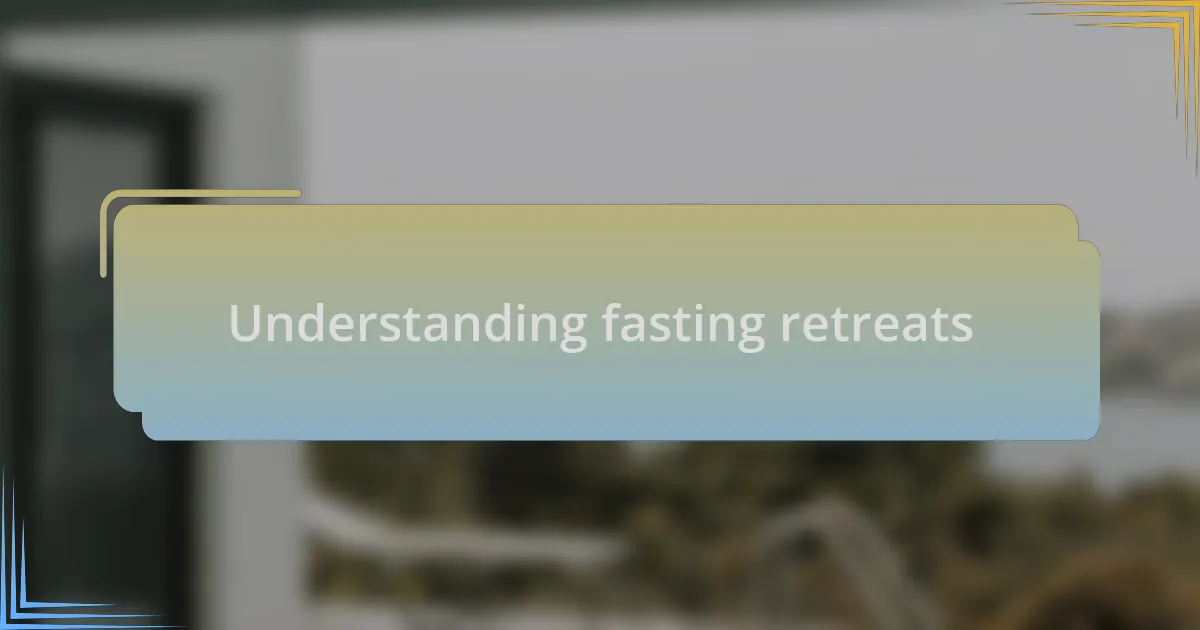
Understanding fasting retreats
Fasting retreats are fascinating spaces where individuals embark on a journey of self-discovery through the practice of abstaining from food. I remember my first encounter with a fasting retreat; I was both excited and anxious, unsure of what to expect. It felt like stepping into the unknown, a blank canvas where my body and mind could reset.
The experience often goes beyond just not eating; it encompasses meditation, reflection, and sometimes guided exercises that engage the spirit. During one retreat, I found myself journaling my thoughts in silence, paralyzed by the clarity and emotional release that came from stripping away distractions. Have you ever found silence so loud that it drowns out the chaos of daily life? For me, that stillness became a sanctuary.
Understanding fasting retreats means recognizing their potential to foster deep connections with ourselves. Many attendees report breakthroughs in their mental clarity and emotional well-being, akin to a fog lifting from their minds. I certainly felt that sense of renewal, as if the retreat had scrubbed away layers of emotional baggage I didn’t even know I carried.
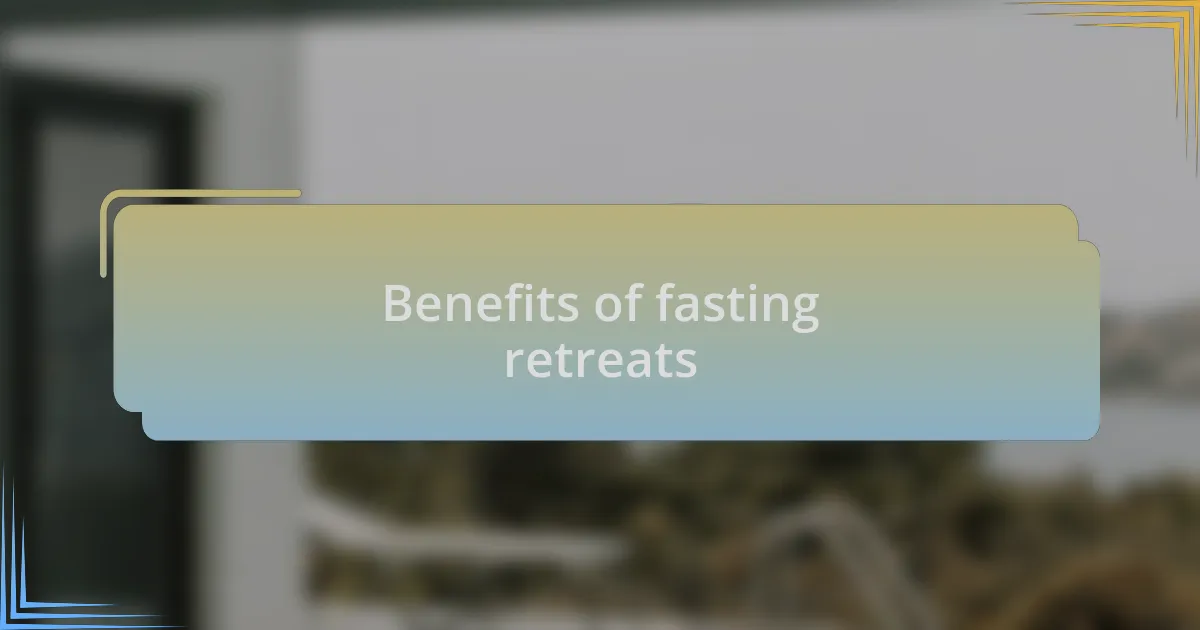
Benefits of fasting retreats
Fasting retreats offer profound physical benefits, which I discovered firsthand. During my first retreat, I noticed an unexpected surge in energy and vitality after just a few days of fasting. It might sound counterintuitive, but giving my digestive system a rest allowed me to feel lighter in both body and mind. Have you ever felt that exhilarating sense of freedom when releasing something that no longer serves you? That’s how I felt, as if the weight of everyday indulgences had vanished.
Another significant benefit I encountered was the deep emotional healing that can unfold in a supportive retreat environment. One evening, while reflecting on my journey, I found myself confronting feelings I had buried for years. The honesty and vulnerability within the group allowed me to express emotions I had long suppressed. This supportive atmosphere can be transformative—have you ever considered how a shared experience can create a safe space for personal revelations?
Lastly, fasting retreats cultivate a sense of mindfulness that extends far beyond the duration of the experience. After returning home, I found myself approaching meals with a new level of intention, savoring each bite rather than rushing through my meals. It’s amazing how something as simple as fasting can teach you to appreciate the nuances of life. What if the act of fasting could shift your perspective on not just food, but on all aspects of your daily routine? Embracing this newfound mindfulness has enriched my life in ways I never anticipated.
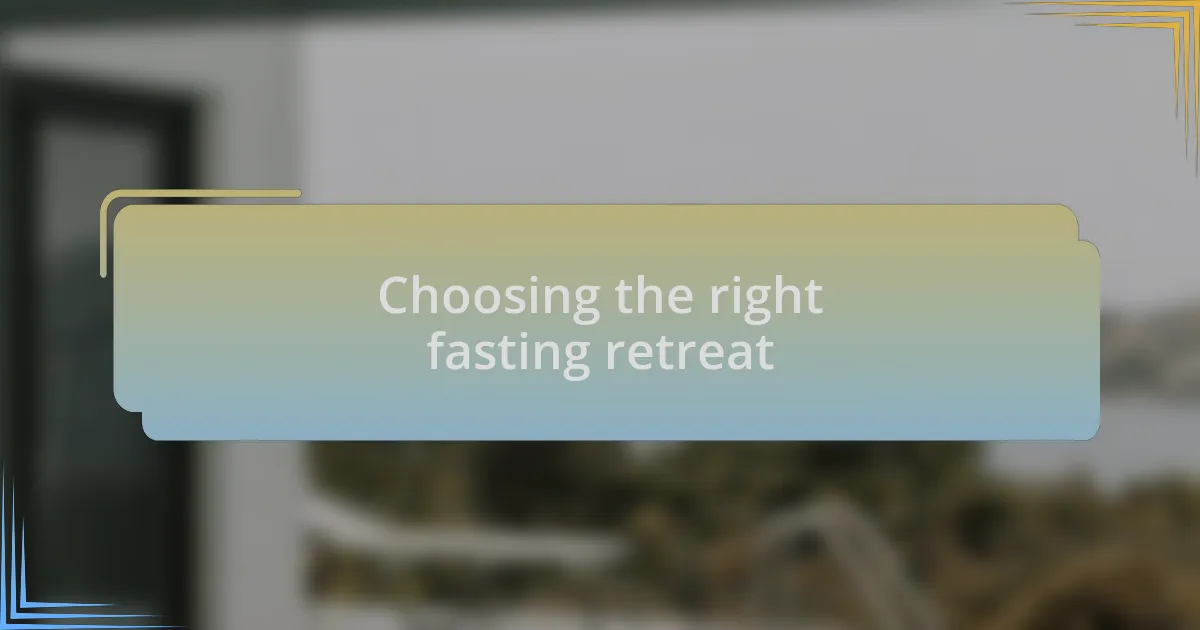
Choosing the right fasting retreat
When selecting a fasting retreat, it’s essential to consider the location and the overall ambiance of the place. I remember attending a retreat nestled in the mountains, which immediately set a peaceful tone for my experience. The serene environment not only enhanced my focus but allowed me to connect with nature, making the fasting process feel more organic. Have you thought about how your surroundings impact your mindset during such an experience?
I also recommend researching the retreat leaders and their philosophies on fasting. At one retreat, the facilitator shared her personal journey and the healing power of fasting, which resonated deeply with me. It created a bond with the group that transformed our shared struggles into a collective triumph. How do you think the expertise of a facilitator can shape your retreat experience?
Lastly, pay attention to the structure and duration of the fasting program offered. Some retreats are tailored for beginners with supportive guidance, while others may challenge you and push your limits. I recall feeling overwhelmed by the intensity of my second retreat, which wasn’t as aligned with my personal goals. It’s important to ask yourself: what am I hoping to achieve through this fasting experience, and which retreat aligns with my intentions?
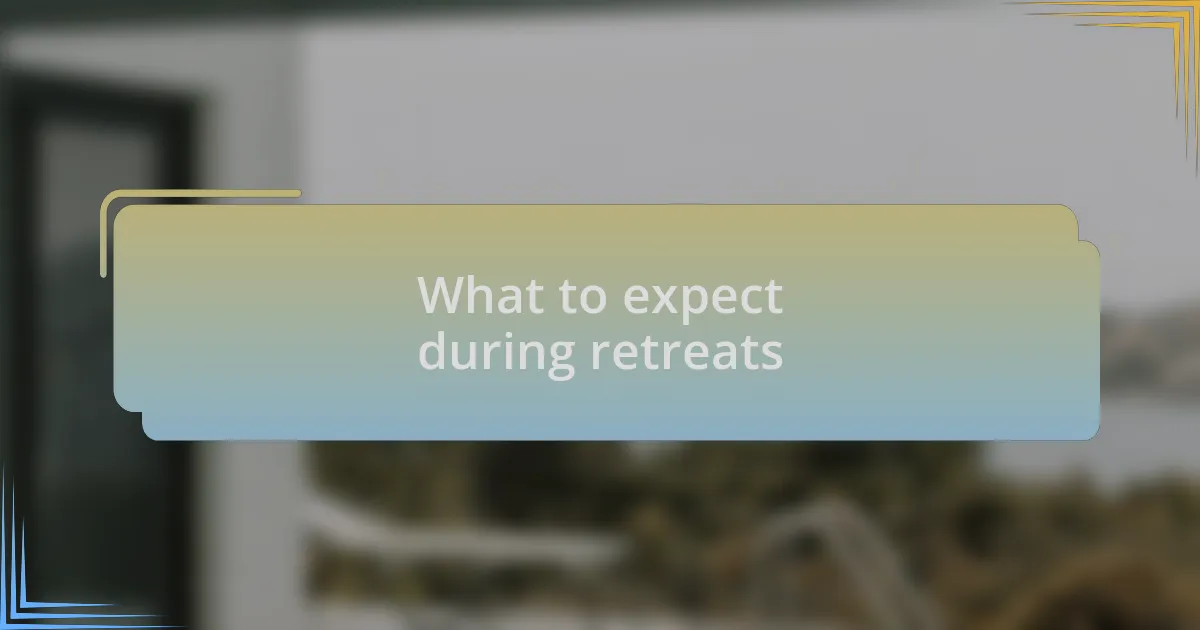
What to expect during retreats
During a fasting retreat, you can expect a structured schedule that balances meditation, gentle movement, and communal sharing. At one retreat I attended, I was surprised to find how much joy I derived from simple group meals where we shared our fasting experiences. Those moments of connection were profoundly uplifting, reminding me that fasting doesn’t have to be a solitary endeavor.
You’ll also likely engage in workshops or discussions focused on mindfulness and self-discovery. I vividly remember participating in a workshop that explored emotional eating, which challenged my perspective of food and its role in my life. It was an eye-opener, helping me to understand my habits on a deeper level and fostering a sense of awareness that I still carry today.
Be prepared for emotional fluctuations as well. I once experienced a wave of sadness during a retreat, and it caught me off guard. Yet, I learned that these emotions can be a part of the fasting journey, revealing underlying issues that need attention. Have you considered how fasting not only affects your body but also taps into your emotional landscape? It can be an enriching and transformative experience if you allow yourself to feel and process what comes up.
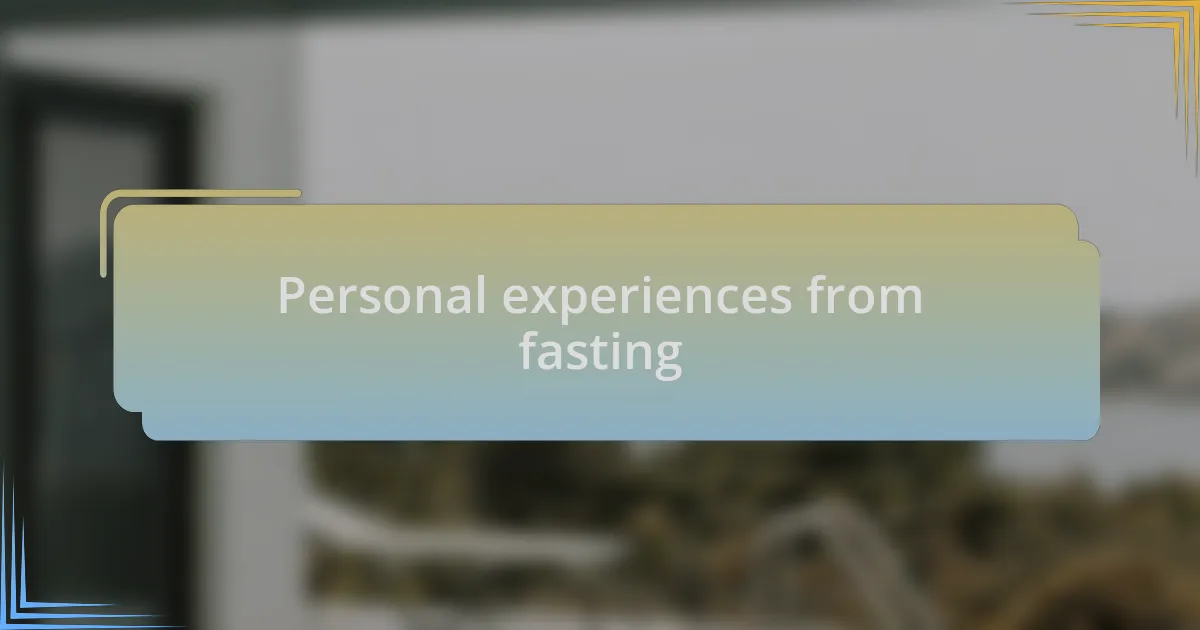
Personal experiences from fasting
At my first fasting retreat, I remember feeling a mix of excitement and apprehension. I had always associated food with comfort, so the idea of giving it up felt daunting. However, I discovered a surprising lightness both physically and mentally as I moved through the days. It was liberating to shift my focus from meals to mindfulness, and I found myself more attuned to my thoughts and surroundings.
There was a particularly poignant moment when we were encouraged to write letters to our future selves. I let my pen flow freely, revealing hopes and fears that I had tucked away for too long. Rereading that letter weeks later made me realize how fasting acted as a catalyst for self-reflection, ultimately opening up channels of emotional clarity I never knew existed. Have you ever thought about how moments of stillness can lead to revelations about your innermost desires?
Returning home after the retreat, I carried a blend of peace and restlessness. While I embraced my newfound perspectives, I wrestled with the challenges of integrating these insights into everyday life. It made me realize that fasting isn’t just about abstaining from food; it’s about creating space for self-exploration and understanding the emotions tied to our eating habits. How do we nurture that awareness beyond the retreat? For me, it’s an ongoing journey, one that continues to shape my approach to food and mindfulness.
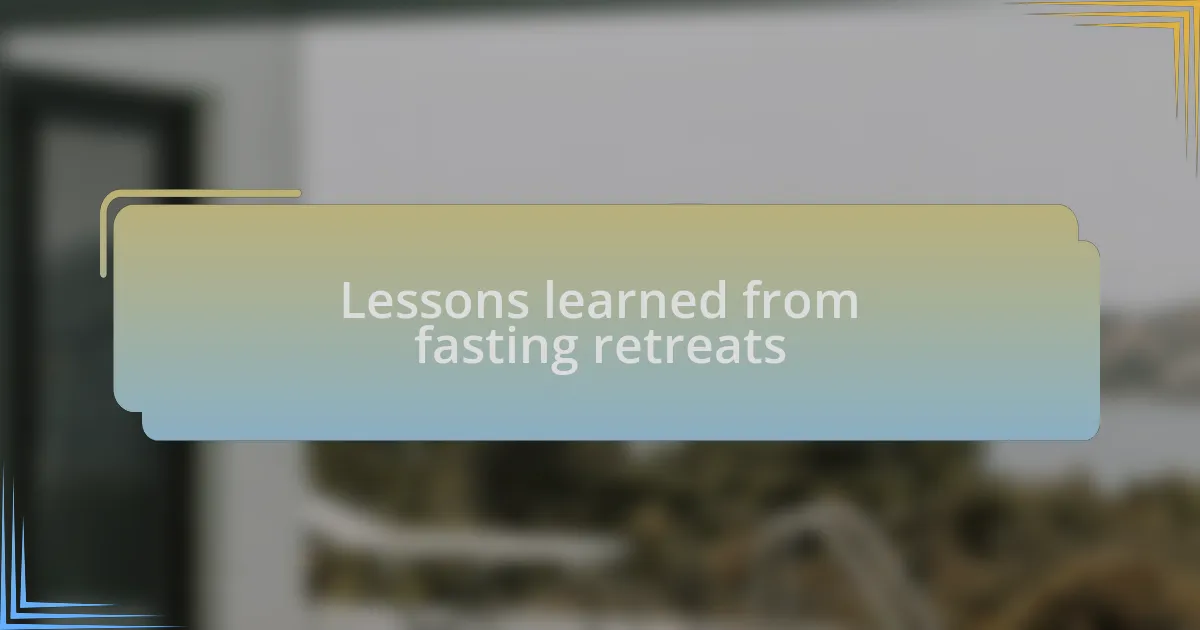
Lessons learned from fasting retreats
Fasting retreats taught me that simplicity can breed clarity. During one particular retreat, I found myself sitting quietly in a sun-drenched room, observing the way my mind raced at first, longing for distraction. But as hours turned into days without food, I noticed those racing thoughts slowly transformed into a tranquil flow of ideas and reflections. It made me consider: what if we all took a moment to pause and simplify our routines in daily life?
Another significant lesson was about connection—both with myself and others. I vividly remember sharing silent meals with fellow retreat participants, where we communicated through smiles and gestures rather than words. This brought a sense of camaraderie and understanding that food always felt like it masked before. Have you ever experienced deeper connections in silence than in conversation? I realized that shared stillness could break barriers that busy conversations often erect.
Lastly, I learned the importance of intention. As I entered the retreat, I set a personal goal to uncover the deeper reasons behind my eating habits. The physical act of fasting became a metaphor for clearing emotional baggage, helping me recognize the triggers that compelled me to reach for comfort food. What intentions do we set in our everyday lives? For me, that retreat was a gentle but powerful reminder that cultivating awareness requires commitment and introspection.